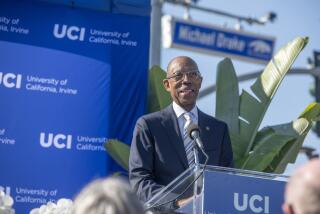UC president OKs self-supporting plan for UCLA business master’s program
UC President Mark G. Yudof has approved a controversial plan to turn UCLA’s MBA program into a self-supporting unit that depends wholly on tuition without state funding.
The approval comes after nearly three years of debate over what critics alleged was an attempt to privatize part of a public university. But the final version is much less ambitious than the original proposal and keeps the UCLA master’s degree in business administration, which enrolls about 720 students, firmly under central UC control.
Addressing criticism that the affluent UCLA Anderson School of Management was seeking independence from a more financially beleaguered UC, Yudof noted that the university-wide faculty Senate would have final say over academic matters and the UC system president and regents would set tuition for the MBA students. He also emphasized that the MBA program must continue to offer financial aid at the same level of similar programs across the UC system.
In a letter this week to UCLA Chancellor Gene Block, Yudof acknowledged that the proposal has faced much opposition on campus. That criticism led officials to abandon an original plan to privatize the entire Anderson school and instead seek self-supporting status only for its largest full-time degree program.
But Yudof, who is leaving his office in August, wrote that the final plan would help UC financially by freeing up what officials estimate will be $8 million a year in state funds that UCLA can put to other uses. “The university is facing unprecedented challenges due to the withdrawal of state support, and careful deliberation on ways to respond is important for preserving our academic quality going forward,” he wrote.
The proposal was viewed by many around UC as a possible turning point in how California’s public universities should respond to years of state budget cuts. Some said the proposed change may start a trend, particularly among business and law schools that are able to charge high fees and have wealthy alumni to help support them. Critics said such an action would harm the public nature of the 10-campus UC system.
As initially made public in the fall of 2010, the plan would have made the entire Anderson school self-supporting, but the final version was limited to the 720-student full-time MBA program and kept the school’s doctoral degree and undergraduate accounting courses on public support.
Anderson school officials have said that donors have promised multimillion-dollar donations if the self-supporting plan goes forward in the expectation that the MBA program will become more innovative once it becomes financially independent from state support.
Judy Olian, the dean of Anderson, described the decision as “a win-win for both the university and for UCLA Anderson.” She said it will enable the school to invest in program innovations “while redirecting state support to other needed priorities at the university.” In her statement, she did not specify whether tuition would be hiked in the near future.
ALSO:
‘We won!’ West Hollywood councilman says of Prop. 8 decision
Search continues for gunman who ambushed two LAPD detectives
Attorneys for Miramonte students, parents fire back at L.A. Unified
Twitter: @larrygordonlat
More to Read
Sign up for Essential California
The most important California stories and recommendations in your inbox every morning.
You may occasionally receive promotional content from the Los Angeles Times.











